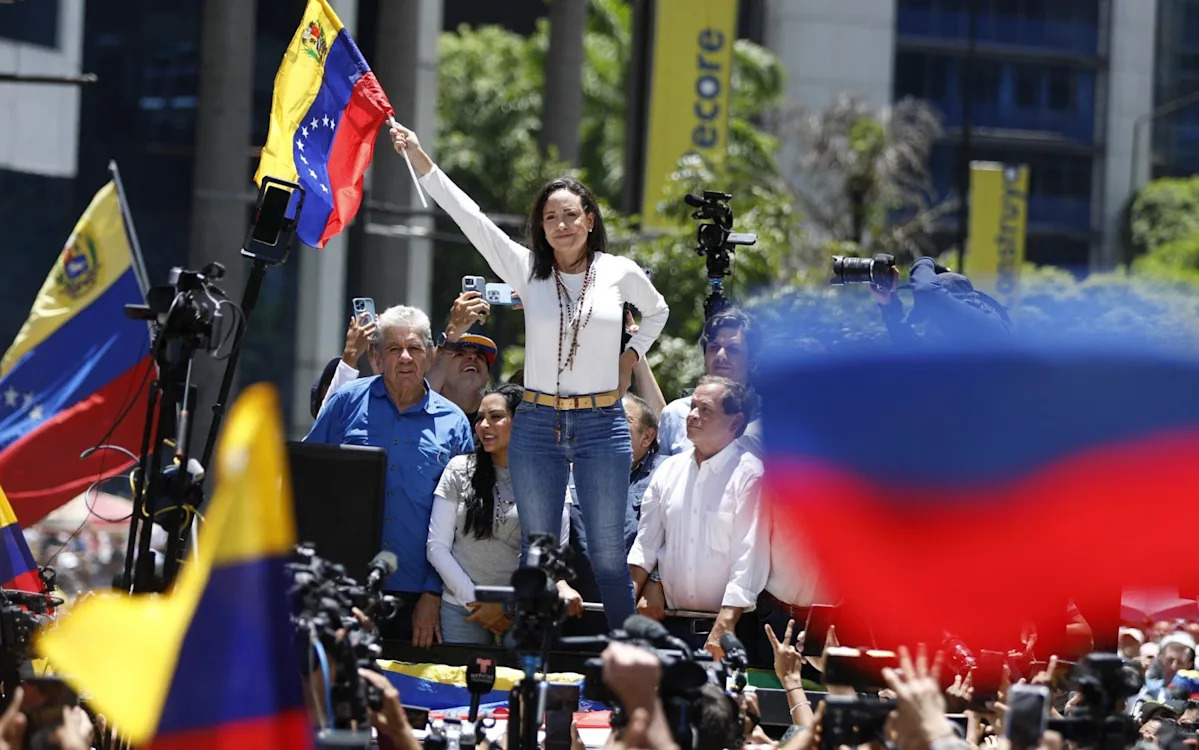
The Nobel committee may not have bestowed its Peace Prize on Donald Trump, but in awarding the honour to María Corina Machado, it has rebuffed one of his sworn enemies.
If politicians were seething at the slight in the White House, they would have been apoplectic in the Miraflores Palace in Caracas, the official residence of Nicolás Maduro, Venezuela’s tracksuit-wearing president – a man firmly in the Trump administration’s sights.
In the eyes of many of his countrymen, Mr Maduro is a usurper who holds the office that should rightly belong to Ms Machado, Venezuela’s enormously popular “Iron Lady”.
But she was barred from standing in last year’s presidential election by the country’s courts, which are widely seen as an appendage of the Maduro regime.
After claiming to have defeated Edmundo González, Ms Machado’s ally – despite independent observers saying there was significant evidence to the contrary – Mr Maduro has ruthlessly suppressed opposition.
María Corina Machado has been living in hiding while Nicolás Maduro’s regime suppresses government critics – Cris Bouroncle/AFP
Hundreds of government critics have been imprisoned. Mr González fled to Spain and Ms Machado is living in hiding.
Mr Trump has shown little interest in democratic backsliding in other parts of the world, but he has become deeply involved in Venezuelan politics.
His administration has given full-throated support to Ms Machado – a free-market, small-state conservative – hailing her as a “freedom fighter”. Marco Rubio, Mr Trump’s secretary of state, has described her as the “personification of resilience, tenacity and patriotism”.
In the past month, Washington has stepped up its pressure on the Maduro regime by launching a series of military strikes against vessels suspected of carrying drugs in the waters off the Venezuelan coast.
The strikes have prompted speculation that the Trump administration is attempting to change Venezuela’s regime, perhaps by encouraging a military coup against a president who is deeply unpopular with his people.
Ms Machado has previously suggested she would welcome the US military’s help in removing Mr Maduro from office.
Before the Nobel Peace Prize was awarded, one potential nominee told The Telegraph she was fearful that the eventual winner could become a target pf Mr Trump’s ire.
By naming Ms Machado as this year’s laureate, that risk has been mitigated. The US president may be privately resentful but it would be quixotic even by his standards to turn against someone his administration has so ardently championed.
Besides, the Nobel committee has done Mr Trump a favour by further eroding Mr Maduro’s reputation, legitimacy and room for manoeuvre. It is much harder to lock up an opponent who has a Nobel Peace Prize medal around her neck than one who does not.
Secure in that knowledge, Ms Machado may even double down on her efforts to rally Venezuelans against their leader. In other words, the committee in Oslo may just have brought Mr Trump’s hopes of regime change a step closer.
The committee has pedigree when it comes to burnishing the reputation of opponents to strongman regimes. Awarding the Nobel to Lech Walesa, Poland’s solidarity leader, Aung San Suu Kyi in Myanmar and Desmond Tutu, the anti-apartheid Archbishop of Capetown, helped cement the reputations of figures who became titans in their respective countries.
It may well have done the same for Ms Machado.
Broaden your horizons with award-winning British journalism. Try The Telegraph free for 1 month with unlimited access to our award-winning website, exclusive app, money-saving offers and more.
Disclaimer: This news has been automatically collected from the source link above. Our website does not create, edit, or publish the content. All information, statements, and opinions expressed belong solely to the original publisher. We are not responsible or liable for the accuracy, reliability, or completeness of any news, nor for any statements, views, or claims made in the content. All rights remain with the respective source.
